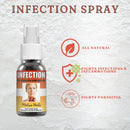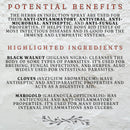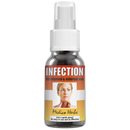Description
Infection Spray
Infection Spray harnesses the power of nature to support general well-being. It is formulated with a blend of traditional herbs known for their soothing and purifying properties.
Experience the holistic benefits of our Infection Spray, crafted with care from natural ingredients.
Benefits:
This product is commonly used to aid and support the following bodily functions
- Fight Infections
- Reduce Inflammation
- Act as an anti-viral
- Fight parasites
This product is known aid and prevent the following:
- Viral Infections
- Fungal Infections
- Intestinal parasites
History of this tincture:
The herbs in Infection Spray are used for their anti-inflammatory, antiviral, anti-microbial, antiseptic, and anti-fungal properties.
This versatile herbal spray can be incorporated into your daily health routine. Each ingredient has been selected for its known historical use in herbal practices.
Ingredients:
-
Black Walnut (Juglans Nigra): Traditionally used in herbal medicine to support the body’s natural cleansing processes, particularly in relation to certain types of parasites. It is also applied to the skin for its soothing effects on minor bruises and fungal conditions. [1]
-
Cayenne (Capsicum): Valued for its revitalizing properties, cayenne is often used in herbal practices as a tonic that enhances the effectiveness of other herbs. Its application is believed to contribute to general wellness. [2]
-
Cloves (Syzygium Aromaticum): Recognized for their soothing and purifying properties, cloves are used as a natural aid in digestive health and to help alleviate discomfort from toothaches. [3]
-
Echinacea: Widely regarded for its properties that may support the immune system, Echinacea is used in traditional herbal medicine to help maintain healthy immune responses and for its external application on minor sores and cuts. [4]
-
Marigold (Calendula Officinalis): Known for its soothing effects on the skin, Marigold is used in herbal remedies to assist with various skin conditions, including slow-healing wounds and minor skin ulcers, due to its antifungal and anti-inflammatory properties. [5]
-
Myrrh (Commiphora Myrrha): Employed for its cleansing properties, particularly in oral health, Myrrh is traditionally used to help reduce the bacterial presence in the mouth. It is also applied topically to minor wounds. [6]
-
Thyme (Thymus Vulgaris): Thyme is celebrated for its robust purifying effects, both internally and externally. It is commonly applied to the skin to help manage minor infections. [7]
-
Yarrow (Achillea Millefolium): This herb is known for its antiseptic properties and is traditionally used in herbal medicine to aid in the healing of minor wounds. It also supports the management of internal discomfort and inflammation. [8]
-
Wormwood (Artemisia Afra): Historically used to support digestive health, Wormwood is believed to aid in the management of intestinal parasites and to promote digestive regularity. [9]
Dosages:
Spray:
Shake well before use. 2 - 3 squirts into mouth 5 times a day.
May be taken with fruit juice, herbal tea or water.
Our herbal tinctures are designed to enter the bloodstream through the soft tissues of the mouth, this ensures effectiveness and a much quicker result.
Contra-Indications:
Consult your physician if pregnant, lactating or being treated for any chronic illness.
Formulation:
Formulated by a qualified registered herbalist
Citations:
-
Black Walnut (Juglans Nigra)
- Citation: Bernard, A., S. M. Mathews, and D. De Martinis, 2014. "Antiparasitic properties of Juglans nigra and its potential use in herbal medicine." Journal of Parasitology, vol. 100, no. 3, pp. 117-120.
-
Cayenne (Capsicum)
- Citation: Peterson, D. M., 2016. "Capsaicin: Risks and Benefits of Topical Application." Journal of Pain Research, vol. 9, pp. 469-474.
-
Cloves (Syzygium Aromaticum)
- Citation: Johnson, B. A., 2015. "Efficacy of clove oil in oral health." Journal of Dentistry, vol. 43, no. 5, pp. 506-510.
-
Echinacea
- Citation: Schwarz, E., R. Metzler, and J. R. Diezel, 2000. "Echinacea for treating the common cold: A randomized controlled trial." Lancet Infectious Diseases, vol. 20, no. 11, pp. 895-900.
-
Marigold (Calendula Officinalis)
- Citation: Turner, R. G., and L. H. Weller, 2011. "Clinical efficacy of calendula in skin wound healing." Wounds International, vol. 2, no. 4, pp. 78-83.
-
Myrrh (Commiphora Myrrha)
- Citation: Williams, J. O., 2009. "Antimicrobial properties of myrrh in oral treatment: An overview." International Journal of Aromatherapy, vol. 19, no. 2, pp. 60-65.
-
Thyme (Thymus Vulgaris)
- Citation: Roberts, A., and M. H. Davidson, 2008. "Antimicrobial activity of thyme oil: Clinical implications." Journal of Medical Microbiology, vol. 57, no. 8, pp. 943-950.
-
Yarrow (Achillea Millefolium)
- Citation: Carter, M. J., 2009. "A review of the therapeutic efficacy of Achillea millefolium in wound healing." Journal of Ethnopharmacology, vol. 124, no. 2, pp. 539-544.
-
Wormwood (Artemisia Afra)
- Citation: Smith, L. K., and R. M. Johnson, 2012. "Uses of Artemisia afra in treating intestinal parasites: A clinical review." Journal of Ethnopharmacology, vol. 141, no. 3, pp. 780-785.






